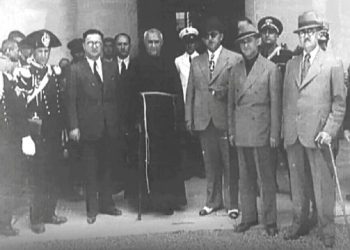By Bashkim Trenova
The fourth part
Memorie.al publishes the memoirs of the well-known journalist, publicist, translator, researcher, writer, playwright and diplomat, Bashkim Trenova, who after graduating from the Faculty of History and Philology of the State University of Tirana, in 1966 was appointed a journalist at Radio- Tirana in its Foreign Directorate, where he worked until 1975, when he was appointed as a journalist and head of the foreign editorial office of the newspaper ‘Zeri i Popullit’, a body of the Central Committee of the ALP. In the years 1984-1990, he served as chairman of the Publishing Branch in the General Directorate of State Archives and after the first free elections in Albania, in March 1991, he was appointed to the newspaper ‘Rilindja Demokratike’, initially as deputy / editor-in-chief and then its editor-in-chief, until 1994, when he was appointed to the Ministry of Foreign Affairs. with the position of Press Director and spokesperson of that ministry. In 1997, Trenova was appointed Ambassador of Albania to the Kingdom of Belgium and to the Grand Duchy of Luxembourg. Unknown memories of Mr. Trenova, starting from the war period, his childhood, college years, professional career as a journalist and researcher at Radio Tirana, the newspaper ‘People’s Voice’ and the Central State Archive, where he served until the fall of the communist regime of Enver Hoxha, a period of time when he in different circumstances became acquainted with some of the ‘reactionary families’ and their sucklings, whom he described with a rare skill in a book of memoirs published in 2012, entitled’ Enemies of the People ‘and now brings them to Memory readers. al
Continued from the previous issue
“Enemies of the people”
My neighborhood friend, Behxhet Agolli, then worked with Haxhi Lleshi!
I do not know if Behxhet wrote the letter. I do not know if she did it, how she was received, how she reacted to it. I know, meanwhile, that Behxhet Agolli later worked as a lawyer in the People’s Assembly of Albania, that is, near Haxhi Lleshi, until one day he quarreled with him and left from there. With the democratic changes, Behxheti merged with the Republican Party, which was formed as an opposition party to the ruling Labor (Communist) Party. This Party came to the defense of owners whose property had been seized, confiscated or nationalized by communism. I was working at that time in the newspaper “Rilindja Demokratike”, the newspaper of the Democratic Party, which would take power after the fall of communism in Albania.
One day Behxheti comes to my editorial office and brings me for publication an article written by him about his uncle, Fiqiri Dinen. His uncle had entered the history of World War II, as an accomplice of the invaders. By June 1944, he had been prime minister of the government known as the Quisling. After two months he resigned from the post and then, with the end of the War, he fled Albania. Behxhet wanted to give a positive version of Fiqiri Dines’ activity. I did not keep the article. I told him that now is not the time for publications of this nature, to see later. Behxhet did not react, he was silent. He then published it elsewhere.
How many “affected”, how many “enemies of the people” were in our little alley? I had never asked this question and it never occurred to me to count her “touches” until the moment I decided to write these lines and when I saw with the same surprise that they had not been few!
Two houses behind that of Varvarica, at the end of the alley, was the house of the Zeralins. It was a beautiful house, raised a few steps, with a large courtyard in front. In the center of the yard was a large white mane, which we children, when given the opportunity, did not forget to throw stones at, to knock down the grains, just as we did with the Kolaver mane. In fact, we had it easier with the Zeralin mani, because the wall of their yard had collapsed and so we went in and out as in our house.
The “affected” family of Zeralins, from the Queen Mother!
The Zeralin family consisted of their parents, Fiqiriu and Shadia, as well as their five children, including two sons and three daughters. It was a simple family that came from the province of Mat, where the former King of the Albanians, Zogu I, was originally from. Fiqiri worked as a stage worker at the People’s Theater, and until his eldest son, Envai, grew up, his salary was the only source of livelihood for the family.
The Zeralians were also “affected”. The regime introduced as tenants the family of an army captain, who came to Tirana from the south of Albania. The Dabulla family, as it was called, consisted of four members, parents and two children, a son and a daughter. They were thus as few in number as the Zeralin family and, despite this fact, despite the fact that the Zeralins were the owners of the house, the tenants occupied the largest and most comfortable part of the house, the front part. The Zeralians were “satisfied” with what was left, i.e. with basements, which they used to live during the day and one or two rooms above them, to sleep. They could no longer enter their house from the front stairs, which were reserved only for tenants, but from a narrow road corridor about 50 centimeters, at the back of the house.
What had the Zeralians done to communism or popular power? Nothing in the past and nothing in the future. What danger could Fiqiriu pose as a stage worker for the dictatorship of the ruling working class, as the new regime established after the Second World War was named after him? Why should he and his family be punished in such housing conditions? This can only be explained by the logic of the great paranoid at the top of the dome of power and the other paranoid who surrounded him and who believed that the more cruel they were to people, the more inhuman they behaved, the more protected they were. .
In fact the Zeralin family had a fault and that was her only fault. The queen mother had a tribal connection with Fiqiri’s mother. The Queen Mother had given the house as a gift to Fiqiri’s mother. That was enough for the Zeralians to enter the “affected”, to those to whom the government could not remain indifferent, without punishing them in one way or another.
We, meanwhile, continued to take advantage of the Zeralinja mania and their collapsed walled courtyard. The Zeralians, of course, did not have the financial means to re-erect the wall of their yard. This suited us “for our artistic life”. As children, in some cases, we improvised a theatrical group as well as a theatrical piece. We used the wallless courtyard of the Zeralins as a stage. As a hall we used the stairs of the Pasholls’ house, which were only about two meters away from the collapsed wall of the Zeralins. We did not miss the spectators. In our alley many women were not engaged in work at that time.
We would go and knock on doors and invite them as spectators of our “spectacle.” They came with joy, either to see something cheerful, that made them laugh, or to our childish improvisation of the “spectacle”, or because that was how they gathered and exchanged words between them. The Zeralians, although we were never given permission to use their yard as a stage, never expelled us from the “stage” as unwanted or uninvited. Perhaps this may have been influenced by the fact that Fiqiriu worked as a stage worker at the People’s Theater, so in a way he was associated with the theater.
Envai, who was the eldest son in the family, could have taken us under his protection. Envai himself had a passion for theater. He even played quite successfully once on stage. He was entrusted with the role of Bajram Curri, one of the central figures of political life in Albania in the 1920s. The first applause was the last one given to him. Envait, certainly commissioned by power mechanisms, was no longer offered any role. By the logic of power, a sucker of such a family as the Zeralins could not be allowed to be applauded and admired, even in an amateur scene.
My failed attempt to enter the People’s Theater “disguised”!
For me, here, in the courtyard of the Zeralins, the love for the stage and the theater begins. As children we were not allowed to enter the hall of the People’s Theater then. I remember, once this Theater organized a show for women during the day, just like our «group»! I knew they would not let me into the hall. I went to my aunt, Seri, to help me find a solution; it was enough for me to enter the hall. She went to a neighbor and asked for a loan for her sheet. The neighbor gave it to her and my aunt followed me, saying: “Put on the sheet, no one will understand that you are a child and a boy. That is how you will enter the hall. “So it was and it was not. I wore the sheet to Aunt Serit’s house, taking care to hide anything that might betray me. Aunt laughed pleased with my appearance and her help. When I got the “passable” grade, I left the house and started walking towards the People’s Theater.
It was located where it is today, in the center of Tirana, near the complex of buildings of the Ministries of Interior and Defense. I had to walk for about 20 minutes and all the way I was worried that a friend would not recognize me. I feared that in such a case, he would surely make fun of me enough. He would even saturate others, our common acquaintances with his “discovery”, i.e. with my coverage. I successfully completed this part of the “action”. When I arrived at the gates of the Theater, I saw there a messy group of women pushing each other with their bodies and elbows to enter the spectacle hall as soon as possible. I approached them several times and just as many times I retreated scared, that I might end up lost badly in the battle of the elbows.
I was worried that a snatched and careless elbow would reveal a part of my face or head would tear the bottom of my sheet. So not only would I miss the spectacle, but I could also get some kick in the butt from Fadil, the wicked goalkeeper who for years waited for tickets at the entrance gate of the People’s Theater. He did not laze in similar cases. In the end, heartbroken, I saw it more expedient to leave, to turn back.
On the way back, I was careful again to cover myself as best I could not be recognized. At one point I suspected that my “conspiracy” was over. A schoolmate, Agim Korbi, was standing in front of me and staring at me. At least that’s how it seemed to me. Maybe it attracted my somewhat special look and not conforming to what we were used to seeing in a veiled woman. Maybe I was “betrayed” by my round head, my boyish gait, shoes that were not for girls or women! However, Agimi passed and even the next day at school did not let me know that he had suspected something or, worse, that he had “discovered” me. I never tried to play “clandestine” again.
The long list of “affected” of our alley!
The list of “affected” of our alley is long. I can mention, among others, Pocket Time, as she was called, or Fatime Kazazi, with her full name and surname. The back wall of the house shared with Timen. She was a somewhat old woman, typically Tirana, with endless humor even though she lived through an endless tragedy. He loved us children and at the same time scared us. “She, to please us, climbed on the plum of her yard, filled her fists and, laughing, threw from us the broken grains, ripe or not. We were, after all, grateful to her.
Timja also had prosthesis in her mouth. Occasionally, crossing the street, she would turn away from us, lift her tongue, and move her prosthesis. She was having fun while we were worried because we had no idea what a denture was. Movable teeth led us into a scary, threatening world. This woman always dressed in black, had something else special, that she used successfully when she faced our iniquities. Her index finger of her right hand was broken and the first half of it looked up, upwards. It was enough for Timja to shake her finger in front of us, to make us realize that the situation was not so favorable and that it was time to “evaporate”.
Fatime Kazazi, with the runaway boy, who was said to be in New Zealand!
Fatime Kazazi was a widow, but she had three sons, or rather had a son, Shabani, known as a well-known baker in Tirana. Another had died, while the last was not known where he was and whether he was alive or dead. Her dead son had left behind his wife, Hajdi, and a son, Napoleon or Lon, as we, his friends, called him. Neither the living nor the dead was called Faith. He had participated in partisan formations during the War. After the War, one day he disappeared without a trace. It was said that Faith had fled to New Zealand. Later, although no one had any contact with him, it was said that he was married there. It was also said that it was the Security, who had organized Faith’s escape to have him as his agent in the world of capital. But why in New Zealand, so far away? Nothing connected Albania with a country like New Zealand at the bottom of the globe. Maybe he hadn’t even been to New Zealand, but so it was said. Everything about Faith remained a mystery until the end, both his departure and his forgetfulness!
The escape from Albania, ie the crossing of the state border, without being authorized by the government, was considered by the communist dictatorship as a betrayal of the Homeland, the Party and the people, a high betrayal. Timja, like hundreds and thousands of Albanian mothers, who over the years had the fate of the Times, thus became the mother of the traitor, was treated as such by the dictatorship. Certainly it was not this that bent him in her old age. The wound was Faith, which she saw in the dream as if it had been returned to her. The wound was so deep that she believed and showed as true even what had neither happened nor was ever to happen. He told our parents that he had received a letter from Besimi, or that they had told him that Besimi would come to Italy soon and that mother and son would meet there, that he would return. Instead of Besimi, a family from the south of Albania came to the Times house and took refuge as a tenant. The same was done with the Kolavers, Varvaricas, Zeralins.
Punishing power was not enough with Timen. I remember how she acted on one occasion with her nephew, our childhood friend, Lon. We had started school. We were primary school students at the “Congress of Lushnja”. In the first years after the war, maybe even after that, in Albania, the leader of the Communist Party, waited in the ‘Palace of Brigades’ for the New Year, the best students of the schools of the capital. Loni was chosen from our school to go to the ‘Palace of Brigades’. We saw her wearing the pioneer costume, blue shorts, a white shirt, and a red three-pointed scarf around her neck. Everything was about to start the party when, suddenly, on its eve it was said that it would not be Loni but another student who would be celebrating the New Year with the Party leader. This was Asim Pregja, our friend and neighbor.
Loni was the nephew of the fugitive Faith, but also the nephew of a political prisoner uncle. Loni handed over the suit and, perhaps for the first time, realized that he was starting life by lining up with “others”, those who were not allowed to be “friends”, “friends’ children”, those who life is not he would caress them, even hit them hard if they were not careful. He would see that he was not the same as his friend or his neighbor, Asim, although Asim himself had neither asked for this nor was he responsible for Lon’s first big lie.
Later when the two became men, Asim made an equal career in the army, becoming the Director of the Central Officers’ House. Loni became a cameraman on state television. With the beginning of the Democratic Movement and after it, Asim joined the left, as did most of the former Albanian communists. Loni became a sympathizer of the right, of the Democratic Party, as well as some of the former communists and all those who had been persecuted by the dictatorship.
The Pirdeni family, which almost became untouched by my friend, Luan… ”!
Almost in front of the house where I lived, more precisely, in front of Behxhet’s house lived the Pirdeni family, Rasimi’s wife, his wife Reti and their five children. They were not “affected”, but in one case they almost became such.
In an electoral campaign for deputies in the People’s Assembly of Albania, Fiqerete Shehu, the wife of the Prime Minister, also presented her candidacy. She met with voters in the schoolyard of the “Congress of Lushnja”, filled with this occasion full of residents of our neighborhood. Of course everything was formal. This is not that I understood then. Fiqerete Shehu, ended her speech with the calls: long live the Party, long live our dear leader, comrade Enver Hoxha, etc., etc. At this time another call was heard, which was added to the money, but which was quite different from them. It was Luani, the third son of the Pirdeni family and my childhood friend who called “Long live the Duchess”! The police and security forces, who accompanied Fiqereten, immediately set in feverish motion to arrest the “worshiper” of the fascist dictator, but failed.
The Lion’s call was issued from outside the school yard. At its outer gate was a public fountain and very close to it an olive tree. Luani and Refik Pasholli, a neighbor of ours, were climbing the olive tree that looked both from the street and from the school yard. Refik had a big head and we, his friends, did not call him by name, but “Duce”, as the fascist dictator, Mussolini, was called. The effect of this call is understood only a few years after the end of the war. The lion cheered for the “Duce” of our alley, but the Party did not know that we children in the alley also had a “Duce”. We were interrogated, but we did not betray either “Duce” or his cheerleader. We did not tell our parents either. We had heard a lot about the partisans who had not spied on their comrades either before the tortures or before they died. Neither could we spy, become spies, traitors! The partisans were our heroes, the ‘stars’ of our childish imagination.
Luan Pirdeni and his family thus escaped the “biography stain”, but how many others I would meet and work with in the years to come would not have this luck. We as children have laughed for a long time with this event. It was really funny, but the regime did not have the same mood, it did not accept without severe punishment and for life even such jokes from children. We, however, continued to call our friend “Duce”, for many years to come. He, accustomed to this second name, never hesitated to answer our calls. Everything changed when he became a man. From “Duce” he became Refik, as he was named on the first day of birth. Memorie.al
The next issue follows





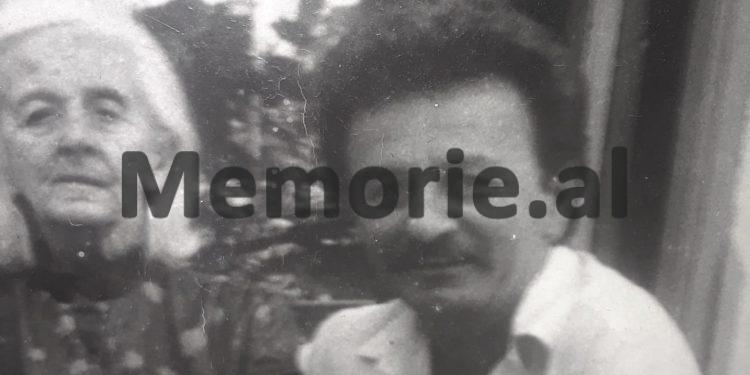
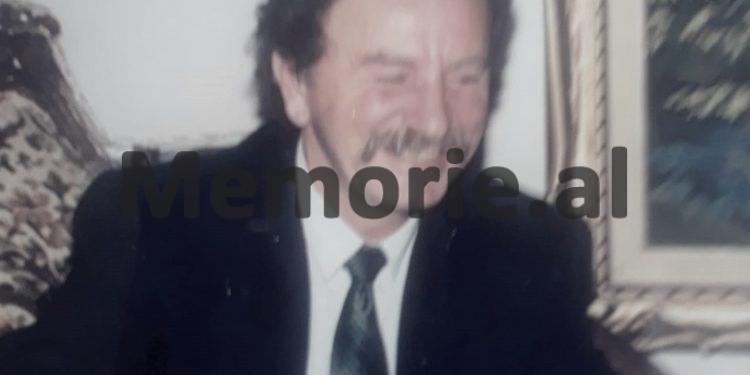
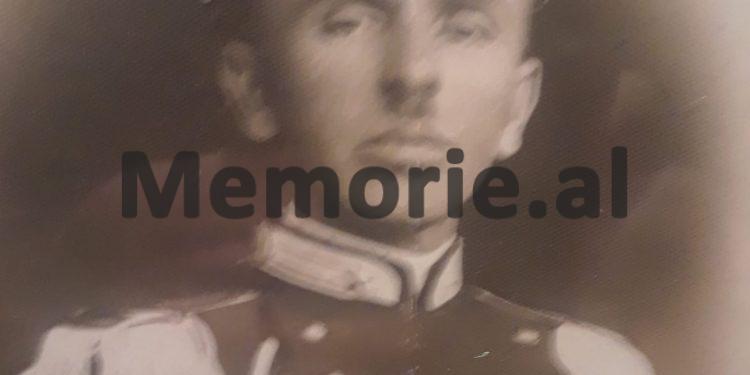

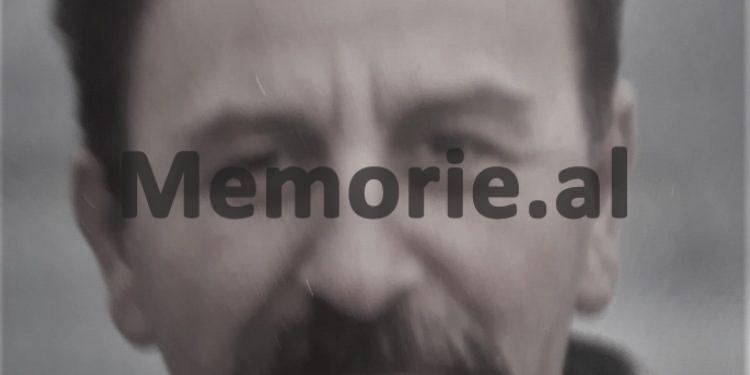

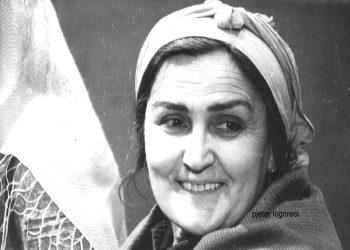
![“When the party secretary told me: ‘Why are you going to the city? Your comrades are harvesting wheat in the [voluntary] action, where the Party and Comrade Enver call them, while you wander about; they are fighting in Vietnam,’ I…”/ Reflections of the writer from Vlora.](https://memorie.al/wp-content/uploads/2025/06/admin-ajax-4-350x250.jpg)


